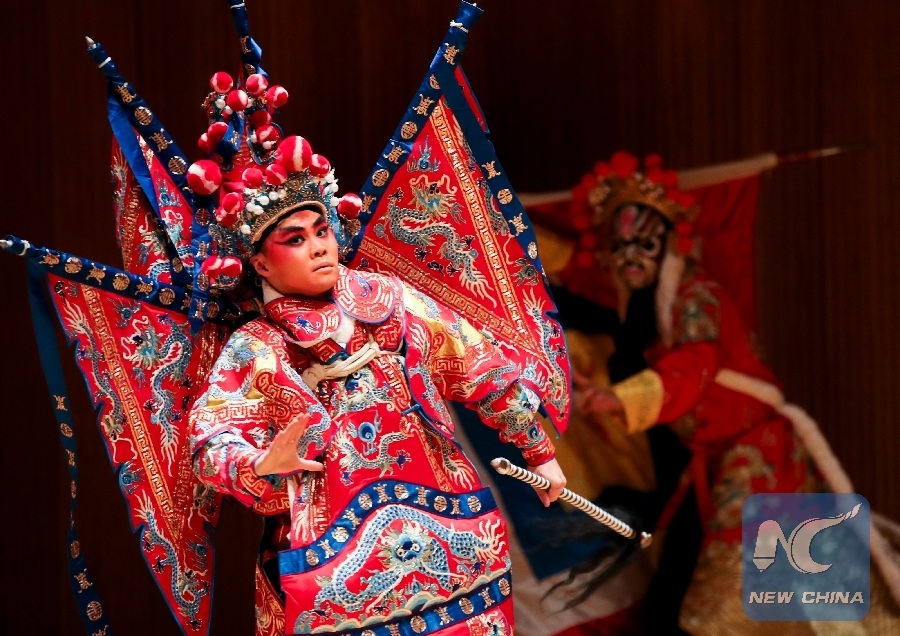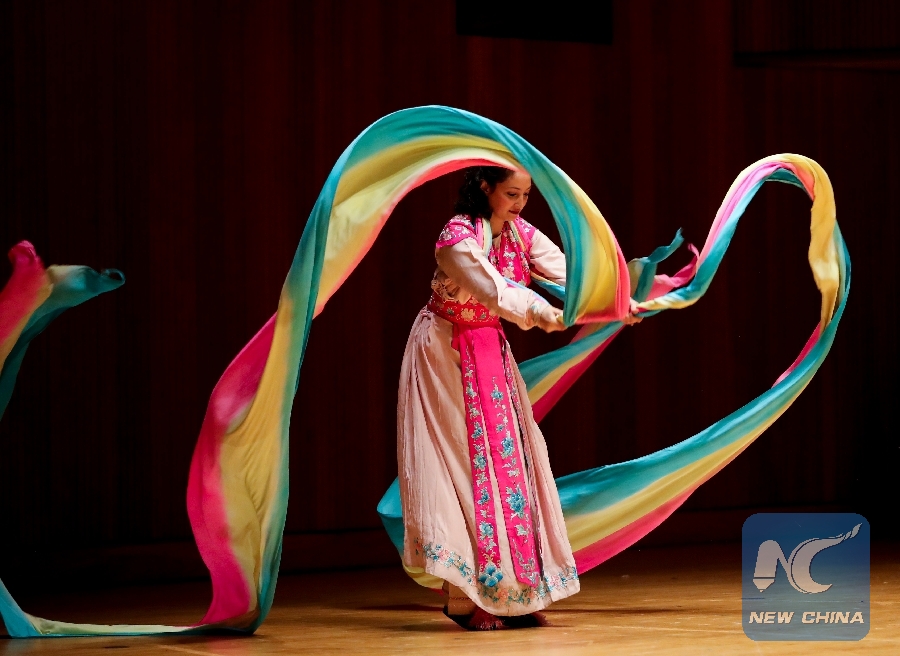
Xu Qiushi from the Confucius Institute of Chinese Opera (CICO) at Binghamton University (BU) performs during the show titled "Amazing Chinese Opera" at the University at Buffalo in Buffalo city of New York State, the United States, Nov. 16, 2018. (Xinhua/Wang Ying)
By Xinhua writers Yang Shilong, Ma Qian
BUFFALO, the United States, Nov. 18 (Xinhua) -- It was a cold evening on Friday at Buffalo, the second largest city in the U.S. state of New York as the temperature dropped down to 36 degrees Fahrenheit (2 degrees Celsius) after a day's heavy wet snow.
Yet it was as in a warm Spring in the Slee Hall at the State University of New York at Buffalo (UB) as about two hundred audience applauded and shouted "Bravo!" time and again during the incredible show of the "Amazing Chinese Opera," featuring the U.S. and Chinese artists from the Confucius Institute of Chinese Opera (CICO) at Binghamton University (BU).
The event, sponsored by the UB Confucius Institute, was the closing event of the university's International Education Week, an annual initiative to celebrate and promote international education and exchange.
Founded in 2009, the BU's CICO is the first such place in the U.S. to offer Chinese Opera lessons through cooperation with the National Academy of Chinese Theater Arts in Beijing, while supplying tools and support for teaching Chinese language and culture.

Carrie Feyerabend from the Confucius Institute of Chinese Opera (CICO) at Binghamton University (BU) performs The Heavenly Maid Scatters Blossoms during the show titled "Amazing Chinese Opera" at the University at Buffalo in Buffalo city of New York State, the United States, Nov. 16, 2018. (Xinhua/Wang Ying)
Barbara Krajewski, 60, a UB biological technician, was among the audience who watched the Peking Opera the first time and were wowed by the delicate makeup, exquisite costumes and headwear, tumbling and acrobatic movements of the opera performers including He Zichen, Xu qiushi, Ting Wang, Qi Zhang and Carrie Feyerabend, also assistant to the CICO director.
"I have quite a few Chinese friends that I've worked with and they've introduced me to some kinds of Chinese cultural events. In fact one took me to Beijing during a vacation, so I'm just very fascinated and interested in the Chinese culture," Krajewski told Xinhua.
"It was fabulous. It's wonderful. The colors, the costuming, the choreographing... it's all wonderful," said Pam Burns, 66, a nearby resident, "(It's) our first experience and won't be the last."
"It was cool. I like it. It's very abstract. There's a lot of symbolism and I thought it was a very bright, like lots of dance fighters," said Joe Sinicki, who said himself a Chinese Opera fan.
Sinicki said he liked the most the excerpt from the Money Tree, presented by Xu qiushi and Qi Zhang. The Peking Opera classic describes a love story between a fairy, Zhang Sijie and an ordinary person, Cui Wenrui. The Jade Emperor in Heaven sent Heavenly Generals down to the earth to punish her, but Zhang Sijie fights with them bravely.
He also was impressed by the "Green Ripples in the Milky Way" performed by Yuming Zhang on Guzheng, which describes the scenes of the famous folktale "The Cowherd and the Weaving Maid." When the Cowherd and the Weaving Girl meet across the Milky Way, the green ripples sing of their everlasting love.
"Yeah, the cool instrument, I like it. I think just she did really good. I like the way she played with the strings. It needs a lot of circular motion on the strings and so just up and down. There goes more fluid than like guitar," Sinicki said.
Another performance that attracted the audience was a Chinese bamboo flute piece Flying Partridges, one of the best-known flute pieces in China. The solo piece describes the desolate scenes after the demise of the Yue kingdom dating back over 2,000 years ago, as a flock of partridges flying across the sky and evokes in people a sense of longing for freedom.
"The bamboo flute actually imitates the cries of different birds and you can hear as if the birds flying overhead into the faraway distance," said Chen Yuxiao, performer of bamboo flute music.
"I hope the vivid melody could make the American audience get a closer touch of the Chinese ancient culture through music, an art form that goes beyond nation boundaries," she said.
"It expanded my knowledge of it in the music. I love the music. I was not familiar with the flute at all... But you recognize the sound of the string, which is a hard type of instrument. But I loved the music. It was very relaxing," said Burns.
Like many others, Sinicki was extremely amazed by Feyerabend's performance of an excerpt from another Peking Opera classic The Heavenly Maid Scatters Blossoms,
"She did pretty good. If I didn't see her, I think she was maybe a Chinese girl," he said.
Feyerabend, who has studied Peking Opera in Beijing, also served the Master of the Ceremony for the event in English and perfect Mandarin.
"As a musician and as someone who appreciates different culture and different religion, the Buddhist piece was just amazing to me," said Lori Burns, 53, another nearby resident. "The limited amount of knowledge that I know and to be able to see that, those kinds of details, the hand movements and the position of the body is very important to me. So that was awesome."
Jenna Lenz, an employee of international student services in the office of international education UB, viewed the show as a window to have a glimpse at the Chinese culture.
"It's obviously very unique to be able to come and see this. It's a really interesting experience obviously to see something that's so very different, especially from anything in Buffalo obviously," Lenz said.
"For me, this is my first time seeing Chinese opera. So it was a great way to learn a little bit," she said. "The performers are clearly very, very talented and it's good to see something so unique and just really entertaining too. But it's a view of an obviously very different culture than what we're used to, so it's a very interesting way to celebrate difference and to see obviously different traditional dance and then instruments and singing. So even for people who aren't necessarily familiar with everything."
The Burns also took the opportunity to let her children, who learned a little bit of Chinese and Chinese culture while they went to school in the state of Kentucky, to learn about the programs at the UB Confucius Institute.
"We saw it on the Facebook. When we moved here and we saw that this was happening. We wanted to get involved in. We're really excited actually. Our youngest is a dancer and she particularly liked the ribbons and that sort of things. So she said that was pretty cool. So we were hoping that maybe the Confucius institute here will give her an opportunity to learn more, which is a great way for American young people exposure to different cultures. So this is really exciting," Burns said.
The opera show was just one of the six programs celebrating Chinese culture contributed by the UB Confucius Institute to the week-long celebrations from Nov.12-16, said the institute's director Zhiqiang Liu.
In 2018, nearly 5,000 students throughout the Buffalo area studied Chinese language in programs supported by the institute.

